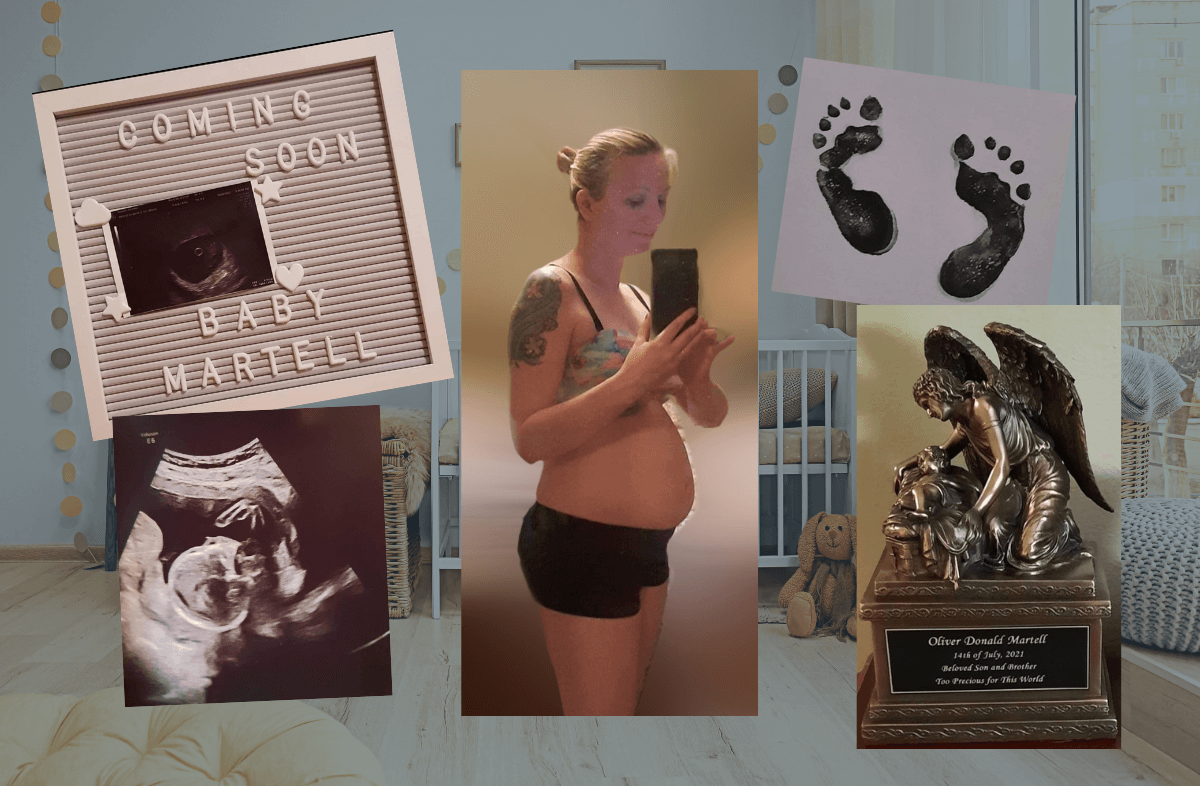
(Photos courtesy Heather Martell)
“I still cannot tell you exactly when life begins,” Heather Martell told UpNorthNews. “But I can tell you when motherhood begins: as soon as that first pregnancy test becomes positive.”
When the conservative-controlled US Supreme Court voted last month to repeal the national right to abortion care guaranteed in Roe v. Wade, it brought an immediate ban to abortions in Wisconsin. But because the state already had only a few clinics, many women were already traveling across state borders for the care they needed. It often meant that an already tragic circumstance was compounded with additional difficulty to travel to a faraway clinic, where they might face angry protesters targeting women during an intensely personal moment.
It is a moment of devastation Heather Martell of Chippewa Falls had to endure about a year ago when receiving what politicians call a late-term abortion nearly 23 weeks into the pregnancy she desperately hoped would have a happier ending.
For Heather, abortion was not a personal choice, but a medical necessity. Her fetus was having seizures, which would only become more painful for him if her pregnancy continued. A 20-week ultrasound also showed her baby had a hole in his heart, malfunctioning kidneys, paralyzed legs, and a litany of other life-threatening health issues. Individually, any one of them may have been treatable, though difficult. Together, they were too much.
This is Heather’s story, as she told it to UpNorthNews.
UpNorthNews Reporter Christina Lorey: You wrote a letter about your experience and you sent it to members of the Wisconsin Legislature after the Supreme Court overturned Roe v. Wade. What did you tell them about your most recent pregnancy?
Heather Martell: I wrote that I have been pregnant three times. I have only a single living child, Jack, born in 2008. I had one miscarriage in 2006 and one second trimester abortion in 2021. Even though I have experienced pregnancy multiple times, I wrote, “I still cannot tell you when life begins: at conception or first breath, most likely somewhere in between. But, I can tell you when motherhood begins: as soon as that first pregnancy test becomes positive.” I asked that legislators do everything in their power to allow mothers, all mothers, to make medical decisions for their children without the interference of the State of Wisconsin.
RELATED: With Roe Gone, Wisconsin Neighbors Offer Rides to Other States for Women in Need of Care
Christina Lorey: You named your second son Oliver. At what point in your pregnancy did you name him?
Heather Martell: It wasn’t until we started getting the bad news—when we found out that he was not compatible with life, that he was going to die. That’s when we said, “He needs an actual name.”
Christina Lorey: Even before the latest Supreme Court decision, Wisconsin had some of the most restrictive abortion laws in the country, banning abortions after 20 weeks. Your abortion happened at 22 weeks and 6 days.
When they first hear that, some people– complete strangers– might and actually have judged you for your “late term abortion.” But can you explain what happened in your pregnancy that prompted you to need one?
Heather Martell: Late-term abortion is actually political jargon, not medical jargon. It’s like partial-term abortion: made up by politicians, not real terms.
I had a second trimester abortion. In Wisconsin, most doctors do not do the anatomical ultrasounds until 20 weeks, so by the time they find out there’s something wrong with the growth and development of this baby, it’s too late. Most people go into an ultrasound thinking, “Oh, cute baby pictures! We get to find out the gender!” They don’t go into it thinking, “Oh my God, this could be horrible.”
Christina Lorey: What, specifically, was problematic about what you found out during that appointment?
Heather Martell: We had done early testing, genetic testing, I had even requested an anatomical ultrasound at 18 weeks, and Oliver was curled up into a tight little ball. He wouldn’t move at the 18 week mark. So we had to come back a week later, a little after 19 weeks, and that’s when we found some things out.
We found out there were problems with his spine, his heart, and his kidneys, which is likely why he was paralyzed and had limited range of movement in his arms. And his legs were completely paralyzed. We found that out that day.
Christina Lorey: I am so sorry. And what did you find out about what his life would likely become if you gave birth to him?
Heather Martell: He had a large hole in his heart, so when his heart beat, it looked like a sponge. He was missing his right kidney and his left kidney was extremely undersized.
So those conditions separately, he would have been able to survive. He would have had some kind of life. But with them all together, not having functioning kidneys is a death sentence as it is. That’s why there are so many ads for kidney donors. We would be bringing in a baby that didn’t have functioning kidneys. He would be on dialysis from day one.
Christina Lorey: At any point, did any doctor try to change your mind or convince you to get an abortion?
Heather Martell: In Wisconsin, doctors don’t say abortion is the best option. None of them do. That’s not a conversation. They tell you what the prognosis is and then they say, “Do you want to talk about your options?”
Christina Lorey: You described your abortion procedure in detail in your letter. If it’s okay with you, I’ll link that here so our audience can read it if they choose, but it’s what happened after that procedure that I want to ask you about next.
You wrote, “We had anti-choice harassers come up to our car on our way out of the clinic’s parking lot. Jason (your husband) nearly ran a harasser’s foot over because she stepped in front of our car while we were pulling out. They physically surrounded our car and started yelling and trying to give us their shame pamphlets. After a severe loss, these psychos wanted to cause us further pain and suffering. They had no clue why we were there.”
If any of the harassers who were there that day happen to hear about you or read this, what would you say to them?
Heather Martell: Boy, I would have so much to say. But I’m sure the FCC wouldn’t approve of some of it. The main message I would have is that these people are taking a religious stand, typically a Christian crusade, against abortion in favor of life. I’m going to school for neuroscience and theology, so I’m no stranger to religion.
I grew up in a Lutheran home, and I remember very clearly my grandmother telling me the story of Christ on the cross and how a Roman soldier had ended his suffering in an act of love and mercy. And that’s how I felt about abortion, that I was ending my son’s suffering before it became too severe.
He was having fetal seizures. Studies show that between 26 and 30 weeks, that’s when the nervous system is complete enough for the fetus to feel pain. We wanted to be sure to avoid that for him.
Christina Lorey: There are a lot of fiercely religious people who are vehemently anti-abortion and they feel that they always will be. But your husband is a Republican. He did change his mind, and he did support you. What changed his mind and does he still align with the Republican Party today?
Heather Martell: Well, I want to clarify. My husband has always been a Reagan Republican. He did not vote for Donald Trump. He does not support Donald Trump. He has been a Reagan Republican all his life, and he is a devout Catholic.
When Jason and I first got married, we would butt heads on the topic of abortion because he was so pro-life and I’m so pro-choice. When the news kept getting worse and worse and worse about Oliver—and I was feeling fetal seizures—I remember putting Jason’s hand on my stomach, and he was like, “What’s going on?”
He began to view abortion as a mercy. The only mercy we could give Oliver. It was like it finally clicked. It was a hard lesson for him to learn. But it was the only way he was able to learn about the need for abortion and why it should be up to medical staff and families, and not politicians and people that have no business making those decisions for other people.
My husband still has some Republican tendencies, Republican beliefs, but I know that this year he will be voting for two Democratic candidates: Dan Hardy [a write-in candidate in the 23rd State Senate District] and Jason Bennett [who is challenging Republican Rep. Rob Summerfield in the 67th Assembly District].
When I sent my letter, I actually ended up talking to Rob Summerfield on the phone, and the things he said to me were so insensitive and so hurtful. He said that if he were in our shoes, he would have let Oliver be born, and he would have prayed the doctors were wrong.
Simple prayer is not going to work there. God helps those who help themselves. That’s why he put doctors and nurses on this Earth.
Christina Lorey: You wrote this letter to legislators, what’s next? What do you hope happens?
Heather Martell: I’m hoping that it educates the people who can be educated. I hope that it can change minds and hearts and help people go, “Wait, I didn’t think about that,” and reconsider some of these bogus, blanket statutes and laws that they’re trying to pass.
It’s a very small percentage of women who are getting abortions after 22 weeks: a very small percentage, less than 1%. When you get to the 20-week mark and you need an abortion, it’s because you have a traumatic reason for needing one. You don’t carry a baby for five months and suddenly think, “This isn’t fun.”
That’s the message that a lot of our Republican candidates are spreading. That abortion is being used as birth control. That abortion is being used later in pregnancy because women just get tired of being pregnant. That’s not what’s happening. It’s important that we start getting vocal.
Christina Lorey: What can people reading or listening to our conversation do?
Heather Martell: Anyone that’s had an abortion: if you’re in a safe place to talk about it, talk about it.
One in 4 women before they turn 45 will have an abortion. We need to make it less taboo. We need to start sharing these stories. That’s how we turn the tide on this. We talk about it openly, honestly, frankly, and unapologetically.
Christina Lorey: Thank you for playing such an instrumental role in starting these open and unapologetic conversations. It’s really people and stories like you and yours that, at the very least, will cause people to think.
Heather Martell: Thank you for sharing this.
NOTE: Even though abortions are now illegal in Wisconsin, women can legally travel out of state to get the healthcare they need. Abortionfinder.org is a free resource to find verified providers and other abortion-related resources such as rides to and from clinics and financial assistance.
Support Our Cause
Thank you for taking the time to read our work. Before you go, we hope you'll consider supporting our values-driven journalism, which has always strived to make clear what's really at stake for Wisconsinites and our future.
Since day one, our goal here at UpNorthNews has always been to empower people across the state with fact-based news and information. We believe that when people are armed with knowledge about what's happening in their local, state, and federal governments—including who is working on their behalf and who is actively trying to block efforts aimed at improving the daily lives of Wisconsin families—they will be inspired to become civically engaged.


This billionaire’s PAC is spreading a big lie about Tammy Baldwin, Medicare, and taxpayer savings
Restoration PAC, funded by Uline’s Richard Uihlein, twists the significance of forcing Big Pharma to negotiate for lower bulk pricing on Medicare...

New Biden rules deliver automatic cash refunds for canceled flights, ban surprise fees
In the aftermath of a canceled or delayed flight, there’s nothing less appealing than spending hours on the phone waiting to speak with an airline...

Opinion: It’s time for Congress to fight for small businesses instead of big corporations
May is National Small Business Month. Our elected leaders need to show leadership all year long. For the past 27 years I’ve been fortunate to pursue...

Biden makes 4 million more workers eligible for overtime pay
The Biden administration announced a new rule Tuesday to expand overtime pay for around 4 million lower-paid salaried employees nationwide. The...





